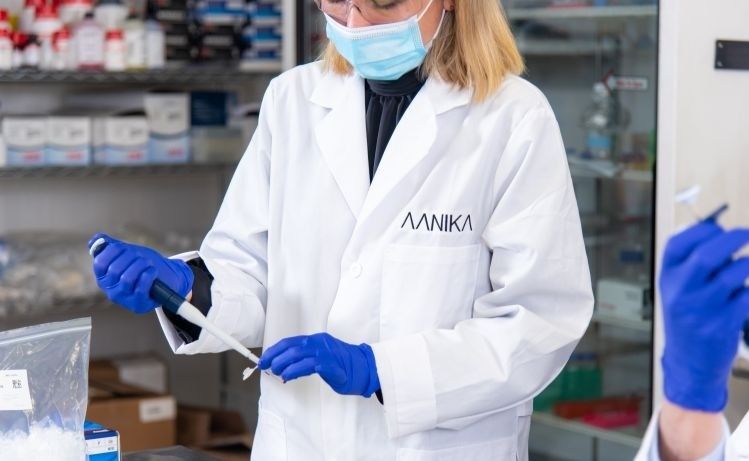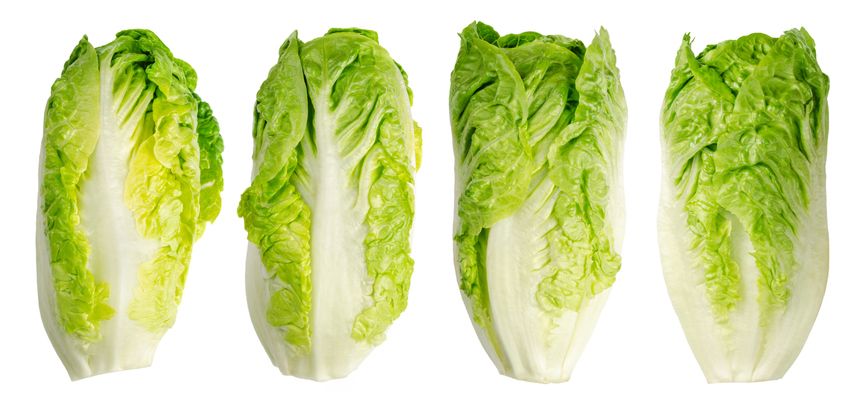Tagging your produce with our edible ‘biological barcodes’ will cost money, Aanika Biosciences founder Vishaal Bhuyan used to tell potential customers. But product recalls and the associated hassle and PR nightmares will cost you a lot more.
“A marginal increase to your COGS (cost of goods sold) in order to be able to find out immediately whether your lettuce is to blame for the latest E.Coli outbreak is like an insurance policy,” he would say. And then a lightbulb went on in his head: “Why not put our money where our mouth is and actually bundle our edible tags with insurance and sell them as a package?”
When it comes to biotech and synthetic biology, says Bhuyan, who cofounded Aanika with molecular biologist Dr. Ellen Jorgensen in 2017, “We were finding that growers just didn’t want to try anything new.
“They don’t know if it works. They don’t have the margins to experiment. And when costs are high, things like traceability tend to move down the priority list. So we started to think about things in a different way, and said let’s bundle our biotechnology with something they understand, which is insurance.
“So now we ask growers and food producers to use our product and in exchange we give them a better insurance policy, which also comes with other things like us doing microbiome and pathogen analysis every month. It comes with our edible tags, which can help you comply with the Food Safety Modernization Act (FSMA), which has strict traceability requirements.
“And so you’re getting this bundle of stuff at a much cheaper rate because we are using our technology to basically underwrite that risk.”
Bio barcodes
Record-keeping has improved as firms seek to comply with tougher traceability regulations, but it can still take months to work out where the lettuce responsible for an E. Coli outbreak actually came from, claims Aanika Biosciences. Meanwhile, trying to determine precisely where commodities such as coffee or cocoa beans originated in many cases is well-nigh impossible if the paperwork can’t be trusted.
With Aanika’s bio barcodes, however, “you can get answers within hours,” claims the startup, which makes invisible, edible tags from inactivated bacterial spores that can be digitally encoded with ‘DNA watermarks’ containing anything from the address of the farm to a lot code. These are then sprayed onto crops at source and can be ‘read’ like barcodes with PCR tests.
In a 2018 E. coli outbreak linked to Romaine lettuce, for example, the CDC ultimately traced the incident back to a farm in Santa Barbara county, announcing the findings of its investigation in early 2019. In the meantime, however, it issued a blanket market withdrawal, creating huge headaches for suppliers that were not responsible, says Aanika.
“In a situation like this, once we know that one of our customers could be named in something we can just do a really quick test to see if our barcodes show up. We can then alert third party labs to run a test to see if there are Aanika barcodes on there.”

Increasing adoption among SMEs
Aanika’s insurance policies are backed by reinsurance company Green Light RE, explains Bhuyan. “We’ve developed our own insurance arm. We wrote our first food recall and contamination insurance policy in March with a leafy greens producer out in Long Island called Satur Farms, and now we’re going out at scale, and looking to write about 10 million of premiums in the next 18 months.”
So what prompted Satur Farms to work with Aanika?
“They were caught up in a food recall in 2019 and didn’t have insurance,” says Bhuyan. “It took three years for them to get through the whole investigation and work through it all, so for example they were named in an investigation in a place that they didn’t even supply and these things can get very complicated. That was one of the reasons that we ended up connecting.”
He adds: “For companies under let’s say $50 million in revenue, adoption [for this kind of insurance] is pretty low, so we’re designing our product to increase adoption among those medium and smaller companies. But the ultimate goal here is to try to get the McDonald’s and the Chipotles of the world to mandate this type of coverage for their suppliers.”
Aanika is currently talking to member organizations that have thousands of farmers or growers, says Bhuyan, who has also developed tags containing antimicrobial peptides designed to fend off pathogens.
“A lot of times, those groups help broker or educate their members on different insurance products, so we’re plugging into those systems. We also think FSMA is going to be a huge tailwind for us, with its traceability requirements.”

Bio barcodes are ‘essentially inert’
According to Aanika’s GRAS notice with the FDA, its bio barcodes are “essentially inert,” with the inactivated bacterial spores moving through consumers’ gastrointestinal tracts “without entering the vegetative and population growth phases of the organism’s life cycle.”
Unlike some earlier ‘bio’ barcodes, Aanika’s can handle UV light, heat, humidity, challenging storage conditions and harsh processing, says Bhuyan, who has raised just under $20 million to date from backers including Adit Ventures, Draper Associates and SOSV.
“We take a Bacillus subtilis spore and knock out its germination genes. In the US, at least, it’s also not going to prompt bioengineered labeling as it’s basically considered like an incidental additive. Growers can then spray the tags on their produce or add them to the wash water in processing.”
He adds: “We have also just received notice from the USDA Animal and Plant Health Inspection Service (APHIS) that Aanika’s tags are not considered a plant pest.”
According to the FDA’s ‘no questions’ letter to Aanika sent on September 11, Aanika deletes four genes required for spore germination from a host B. subtilis strain, resulting in a ‘germination-deficient chassis strain.’ A non-functional DNA ‘watermark’ comprising under 200 nucleotides is then stably integrated into the genome of the chassis strain.
According to a patent filing, the invention “preserves a biological barcode through rigorous environmental conditions of certain supply chains” that can be read “via multiple analytical methodologies, thus, allowing for a simpler, faster, and cost-effective solution for tracking physical articles through a supply chain.”
The exciting thing about the technology is that the barcodes can be combined with additional features and functionality to add more value for customers, says Bhuyan.





